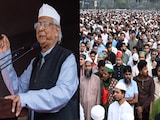When train, bus and air links were snapped and an entire country went into lockdown, the ordinary people became stars of their own epic odysseys, traversing hundreds of kilometres to reach their sons, daughters and siblings.
Covering yawning distances in cars, a scooter and even a bicycle, the reports of family members, often alone, traversing highways snaking through an eerily quiet, shuttered India stood out like little beacons of cheer and courage in times of this grave crisis.
A mother rode 1,400 km on her scooty from Nizamabad to Nellore to pick up her son, a father drove from Bokaro to Kota to bring his stranded daughter home, an Amritsar-based elderly couple travelled to Bangalore to attend their son's funeral, a woman went from Lucknow to Delhi and returned in a day to reach her sister who was reportedly slipping into depression.
Driven by love and powered by grit, their travels and travails gave a sense of the vastness that is India and also defined the extraordinariness of everyday people.
On her nifty and not-very-sturdy red scooty, dressed in black burqa with a blue scarf trailing over her shoulder, Razia Begum became the oft-discussed story of online "drawing room conversations" as pictures of her teen son riding pillion were shared across social media platforms.
The headmistress of a government school in Nizamabad, about 200 km from Hyderabad, rode nearly 1,400 km on a scooter over three days during the lockdown to bring her stranded 19-year-old son Nizamuddin home from Nellore in neighbouring Andhra Pradesh.
The 48-year-old set out on her arduous journey on a Monday morning armed with local police permission and a few chapattis. She rode alone to Nellore and returned with her son on Wednesday evening, demonstrating an endurance level even seasoned rallyists would find hard to match.
"It was a difficult journey on a small two-wheeler for a woman. But the determination to bring my son back overtook all my fears. I packed rotis and they kept me going. It was scary in the nights with no traffic movement and no people on roads," Razia Begum had told PTI.
After losing her husband 15 years ago, she now lives with her two sons - one is an engineering graduate and the other is aspiring to be a doctor.
Nizamuddin, who was in Nellore when the lockdown was announced on March 24, was desperate to return home. And the resolute mother did not hesitate to do everything in her capacity to get him back.
Sheelamma Vasan drove through six states from her village in Kottayam, Kerala, to Rajasthan despite the strict lockdown restrictions.
Accompanied by two relatives, she covered a distance of 2,700 km in just three days to meet her 29-year-old son Arun, who was suffering from myostitis - inflammation of the muscles. He, fortunately, was well when she reached him.
"With god's grace, we reached without any problems anywhere," Ms Vasan said, recounting her journey from Kerala through Tamil Nadu, Karnataka, Maharashtra and Gujarat to reach Rajasthan.
Getting the necessary passes was not easy.
It took the intervention of Union Minister V Muraleedharan, the office of Kerala Chief Minister Pinarayi Vijayan and Congress leader Oommen Chandy.
For the parents of Col Navjot Singh Bal, the journey from Amritsar in Punjab to Bangalore in southern Karnataka was to bid a final adieu.
Their son, who earned a Shaurya Chakra and ran marathons despite battling cancer, died at a hospital in Bengaluru and they had to traverse a distance of over 2,000 km by road to attend his funeral.
The late officer's brother, Navtez Singh Bal, wrote about the family's journey.
Some Army veterans expressed sadness after the couple was forced to travel such a long distance by road to perform the last rites of their son.
In a tweet, former Army chief Gen (retd) VP Malik, replying to a post by Col. Bal's brother, wrote, "Deepest condolences! Have a safe journey. Sad GOI did not help. Rules are never written on stone. They are modified or changed in special circumstances."
And two days ahead of the lockdown, when India observed a "Janata curfew" on March 22, a father reportedly undertook a 50-hour journey in his car, from Bokaro in Jharkhand to Kota in Rajasthan to bring his teen daughter home from the coaching institute where she was enrolled.
Equally determined was a Lucknow woman who drove to New Delhi and back in one day to get her sister. With the lockdown extended till May 3, she was reportedly getting depressed and was without essentials such as food and the woman did not want to wait.
The two sisters returned the same day, taking only a few breaks in between.
One migrant worker decided to cycle down to his home from a centre in Odisha to Maharashtra, desperate to return home and taking only seven days to make the journey, according to reports.
These are just a few stories that were reported. There are countless others who had no vehicles, so they simply walked, sometimes in groups and sometimes alone. They are the migrant workers, made homeless in the cities where they worked, with nowhere to go but their home, and with no transport to ferry them but their feet.
Their tales of determination are yet to be documented. But they too are superheroes for their families and an example for others in a pandemic that may take months to abate.















